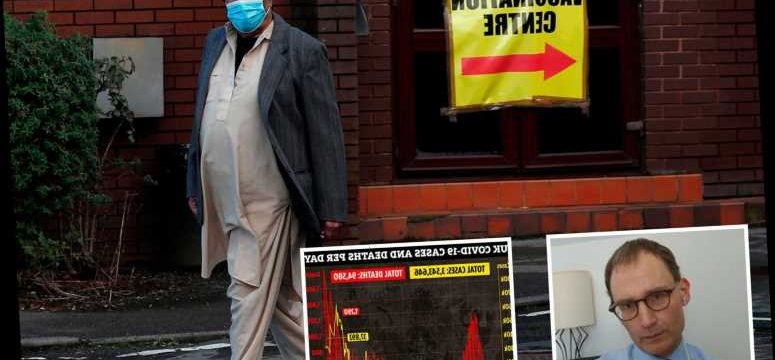THE new mutant Covid variant is 30 per cent more deadly than the old one, scientists have discovered.
Researchers from the government's New and Emerging Respiratory Virus Threats Advisory Group (NERVTAG) have concluded that the new strain will likely kill 30 per cent more people than the old one, ITV's Robert Peston reported today.
? Read our coronavirus live blog for the latest news & updates
The new strain, which was first discovered in Kent, is already more easily transmitted than the older one one too – meaning it is infecting more Brits.
It's being blamed for the huge increases in cases in the UK in the last month.
Professor Neil Ferguson, who sits on NERVTAG, told Peston today: "It is a realistic possibility that the new UK variant increases the risk of death, but there is considerable remaining uncertainty.
"Four groups – Imperial, LSHTM, PHE and Exeter – have looked at the relationship between people testing positive for the variant vs old strains and the risk of death.
"That suggests a 1.3-fold increased risk of death. So for 60 year-olds, 13 in 1000 might die compared with 10 in 1000 for old strains."
The research was consistent across different age groups, regions and ethnicities, he added.
However, he warned that only eight per cent of deaths contain information about which strain they had had.
And he said that Boris Johnson is due to discuss the issue at tonight's press conference.
The PM is due to address the nation and give an update on the latest pandemic information alongside Sir Patrick Vallance and Chris Whitty.
It came as:
- 40,261 new Covid cases were reported in the last 24 hours – and 1,401 deaths
- There were the first signs that the pressure on the NHS is easing as number of Covid patients in hospital starts to fall
- The R rate was officially below one again
- George Eustice said officials were looking at more ways to crackdown on borders and even shut them completely to stop new variants reaching Britain's shores
- Leaked documents revealed plans to give everyone who tests positive £500
- But the Treasury said they'd not even heard of the proposal and livid allies of the PM said it wasn't going to happen
- Plans are being firmed up for the UK to start forcing people to quarantine in hotels when they come into the country
The new variant is feared to have started with one person in Kent, and is now responsible for more and more cases across Britain.
Britain has seen record case numbers on a daily basis in the past month – despite the November lockdown, tougher tiers and then the new year shutdown.
Since the UK announced the discovery of the strain, it has been confirmed in small numbers in France, Belgium, Italy, the Netherlands, Denmark and Australia.
The UK has a strong ability to investigate new mutations of the virus – known as genomic sequencing – which is unmatched by other countries.
Public Health England have been doing extensive work into the new strain, and exploring whether it's linked to more outbreaks.
R WE GETTING THERE
The R – which represents the number of people an infected person will pass Covid onto – is now between 0.8 and 1, Sage today said.
It was estimated to be between 1.2 and 1.3 nationally last week, when the growth rate also suggested the outbreak was continuing to get worse.
The Scientific Advisory Group for Emergencies today said the R is now below 1 in every English region with each falling compared to last week.
In the East of England the R may even be as low as 0.6, while for London and the South East it could be down to 0.7.
When R is below 1, it means transmission is low and the epidemic is shrinking – but greater than that number suggests it's growing.
The last time the reproduction value was below 1 in the UK was December 11 and peaked a fortnight ago when the range was between 1 and 1.4.
While the R number is heading in the right direction, experts warn that it remains dangerously close to the crucial 1 value.
PEAK REACHED?
The number of inpatients in England has fallen for three days in a row, suggesting the “peak” has been reached, fresh figures revealed today.
A total of 33,325 Covid inpatients were reported by NHS England yesterday, January 21.
It’s down three per cent on the 34,336 reported on January 18 – a record high for England.
But most of the change is down to drops in the south of England, including in London.
The north and Midlands are yet to see improvements in their hospital inpatient figures, which are still rising week-on-week.
Source: Read Full Article




